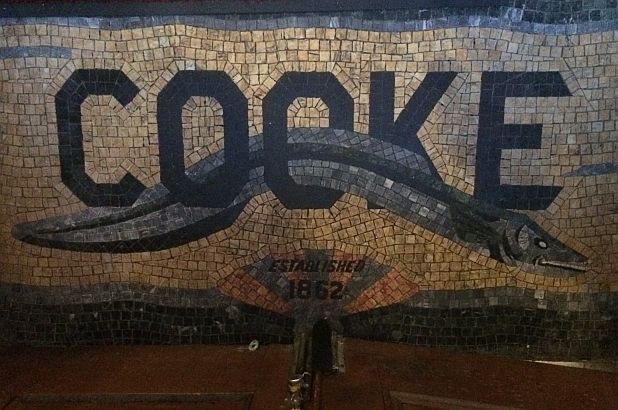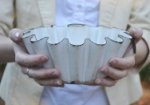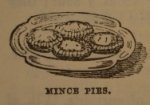And we’re going to catch a jellied one!
Our work with eels has become something of an obsession for this curious cook, who punctuated a research trip to the Old Dart with a quest to find some of the last of London’s traditional jellied eel sellers.
Once a common ‘fast food’, jellied eels have become a rare find in the streets of London. A handful of shops have kept the tradition alive, in cockney London’s East End, and riverside neighbourhoods like Greenwich, on the Thames. The survivors – and I’d like to suggest, revivers – of this culinary classic tend to be ‘pie and mash’ shops, which traditionally sold jellied eels, hot or cold, on the side, in little cups. The hot eels are also served with the pie and mash, all on the same plate, along with the mandatory ‘liquor’, a parsley sauce made from the natural jelly produced by cooking the eels.
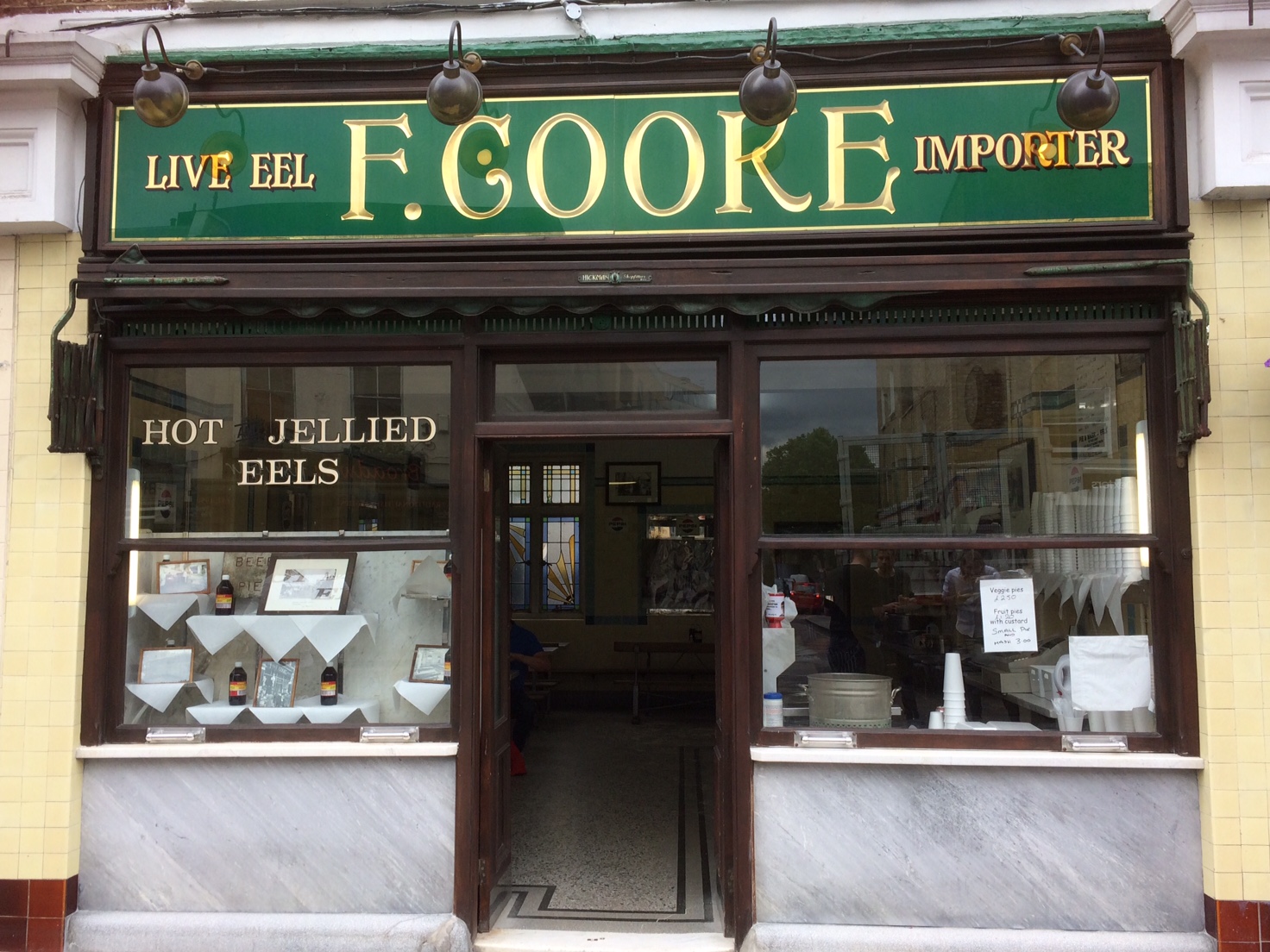
‘Hot & jellied eels’ F. Cooke’s pies, mash and eels shop. 9 Broadway Market, Hackney. UK. Photo © Jacqui Newling
A family empire
F. Cooke’s pies, mash and eels shop at Broadway Market, in the East End borough of Hackney, stands proud of its 117 years heritage as a family run pie, mash and eels shop. Established in 1900, the Broadway market shop has been is run by Bob Cooke, who was born in the residence above the shop. His grandfather opened the first F. Cooke’s pies and eels shop in the East End 1862, his sons later running similar shops in Hackney and Dalston, in 1900 and 1901 respectively.
Bob remains faithful to his family’s retail concept, except the eels are no longer locally caught, but imported from Holland and sometimes New Zealand (more on that below). The pies are where most of his sales are, but dedicated eel seekers and curious tourists such as yours truly, keep the eels side of the business ‘in the swim’ so to speak. His daughter carries on the tradition with a pie and mash shop (sans eels) in Shoreditch.
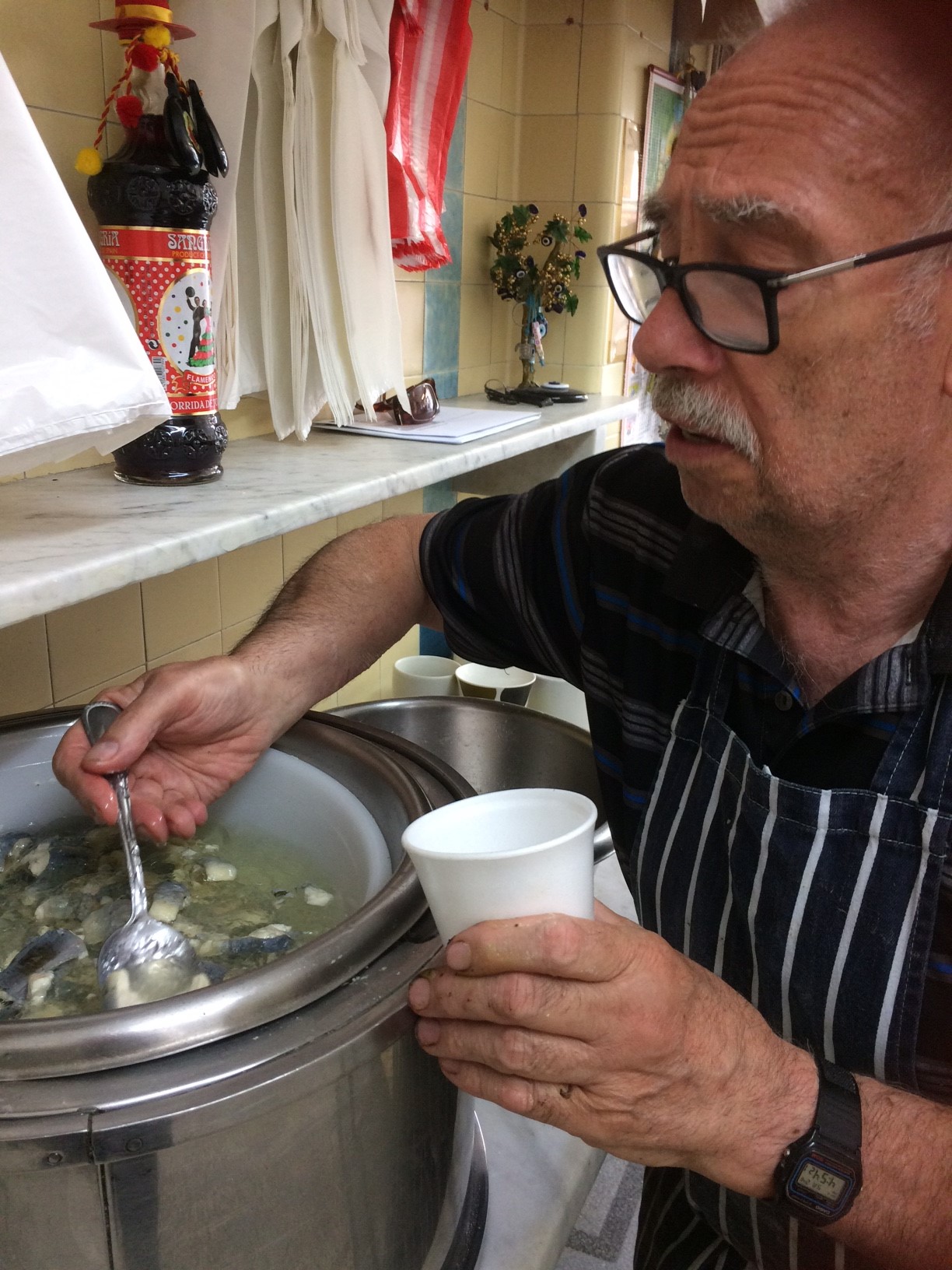
Third generation jellied eel merchant Bob Cooke dishes up my order. Photo © Jacqui Newling
A slippery tale?
Taking a minute to sit and chat as I sampled my chilled eels in jelly from Styrofoam cup Bob cautioned “Watch out for bones! don’t you swallow one! I don’t want to have to call and ambulance – its happened before!” We chatted about our eel cookery experiences – his generations old, mine a bold attempt at recreating collared eel recipes, which he dismissed as ridiculously fussy!
Bob’s technique is much simpler. Each day, he tells me, he prepares his eels, chopping each into one inch portions, throws them into a pot of water with a handful of salt – the only flavouring they need, he insists! – brings the pot to the boil then lets them simmer for ten minutes and they’re done. They’re chilled in their liquor, which naturally sets as it cools, to form the jelly that they’re served with. Any leftover jelly is used to make parsley sauce for the pies and mash.
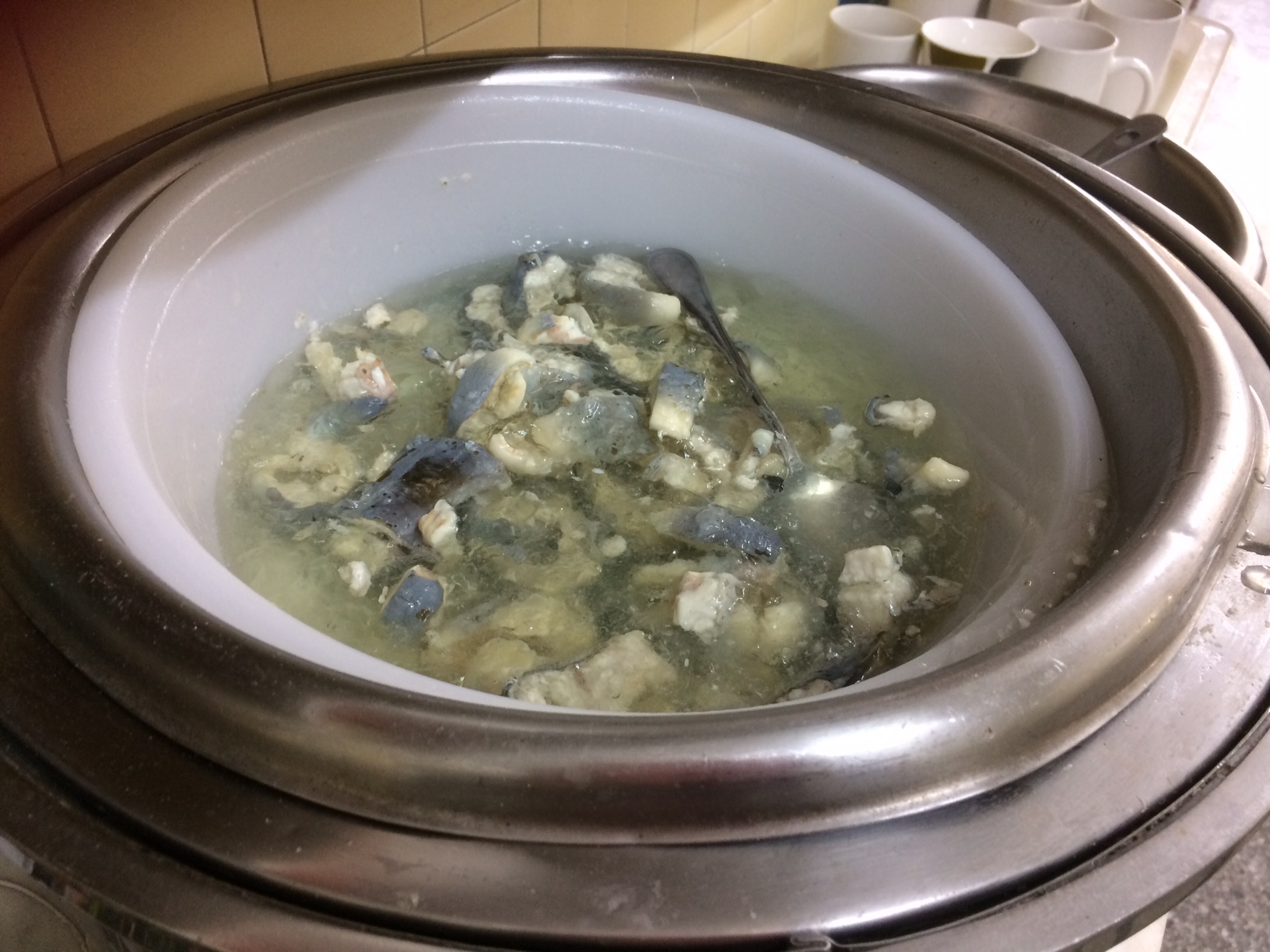
Jellied eels at F. Cooke’s Pie, mash and eels shop. Hackney, UK. Photo © Jacqui Newling
Eels used to be really cheap, which was why they were so popular in poorer parts of London, caught fresh from the Thames, but in recent years they have become very expensive, especially now they’re imported, says Bob. He sells 5 portions of eel for £3 (about $5.00 AUD). It is customary to splash them with malt vinegar – unbrewed is best, Bob advises, or chilli infused vinegar is even better – as a long term fan of chilli vinegar, I concur. It’s a messy job, spooning them from the cup with the semi-liquid jelly, and identifying the bones with some tricky manipulation of your tongue and extracting them with your fingers lest they slip down your throat. It’s quite an art, that I fear I may never quite master.
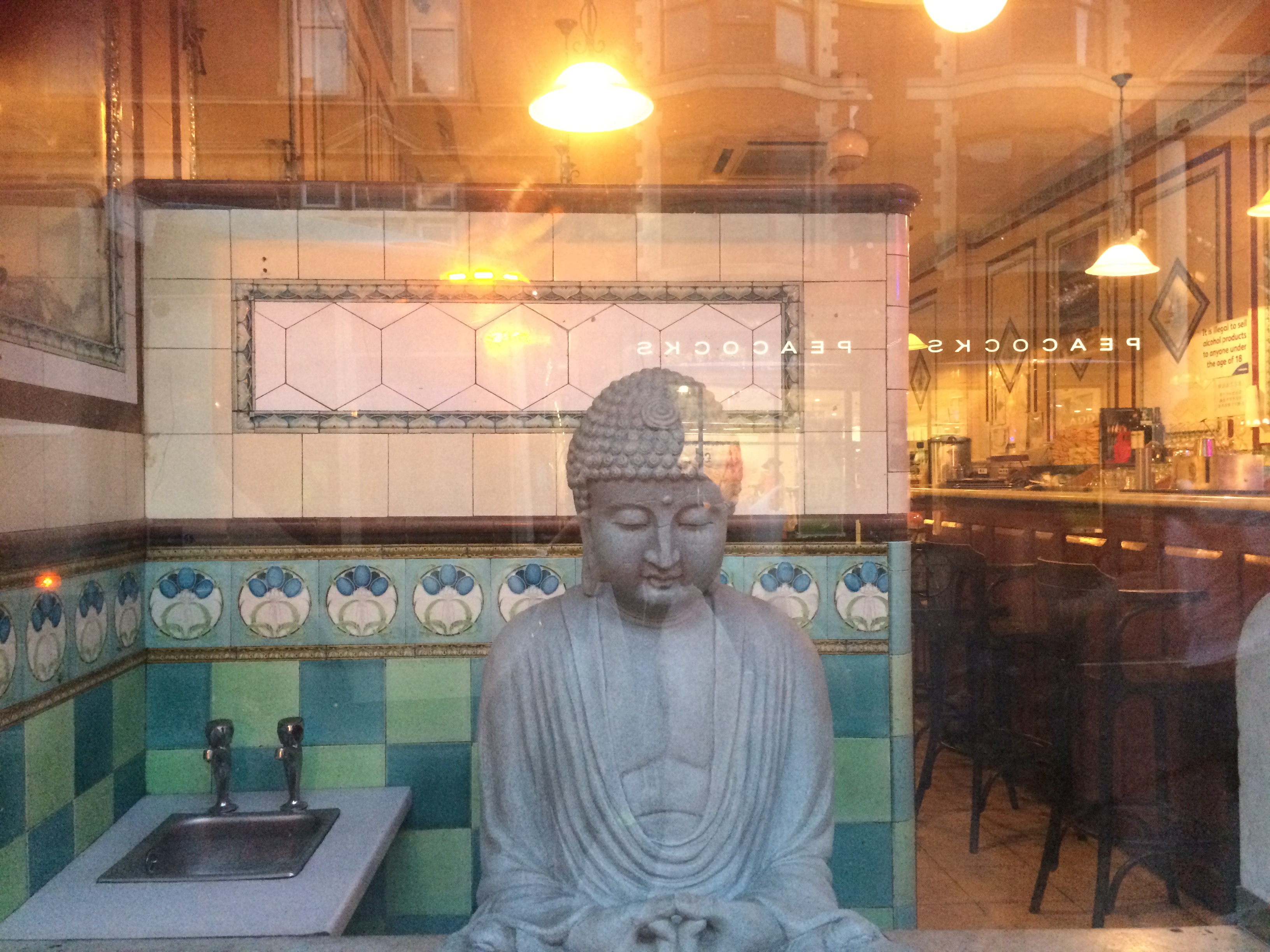
The front window of the Shanghai restaurant in Dalston. Note the marble sink that was once used to clean fresh eels sold at Cooke’s pie and eels shop. Photo © Jacqui Newling
Culture clash
London’s East End has a working class heritage, but the decor in the Cooke family’s establishments shows a sense of pride and style in their detailing. The Kingsland High Road shop, now housing the Shanghai Chinese restaurant, features the Cooke’s original decor (albeit littered with desktop printed signage!) marble bench tops, smart wood paneling, ornate wall tiling, some with fishing scene panels, eel shaped brass fittings, large mirrors (which would have assisted in keeping the room light in the days before electricity) and colourful glassed light domes in the ceiling. Hats off to the new owners (since 1997) for leaving it all intact.
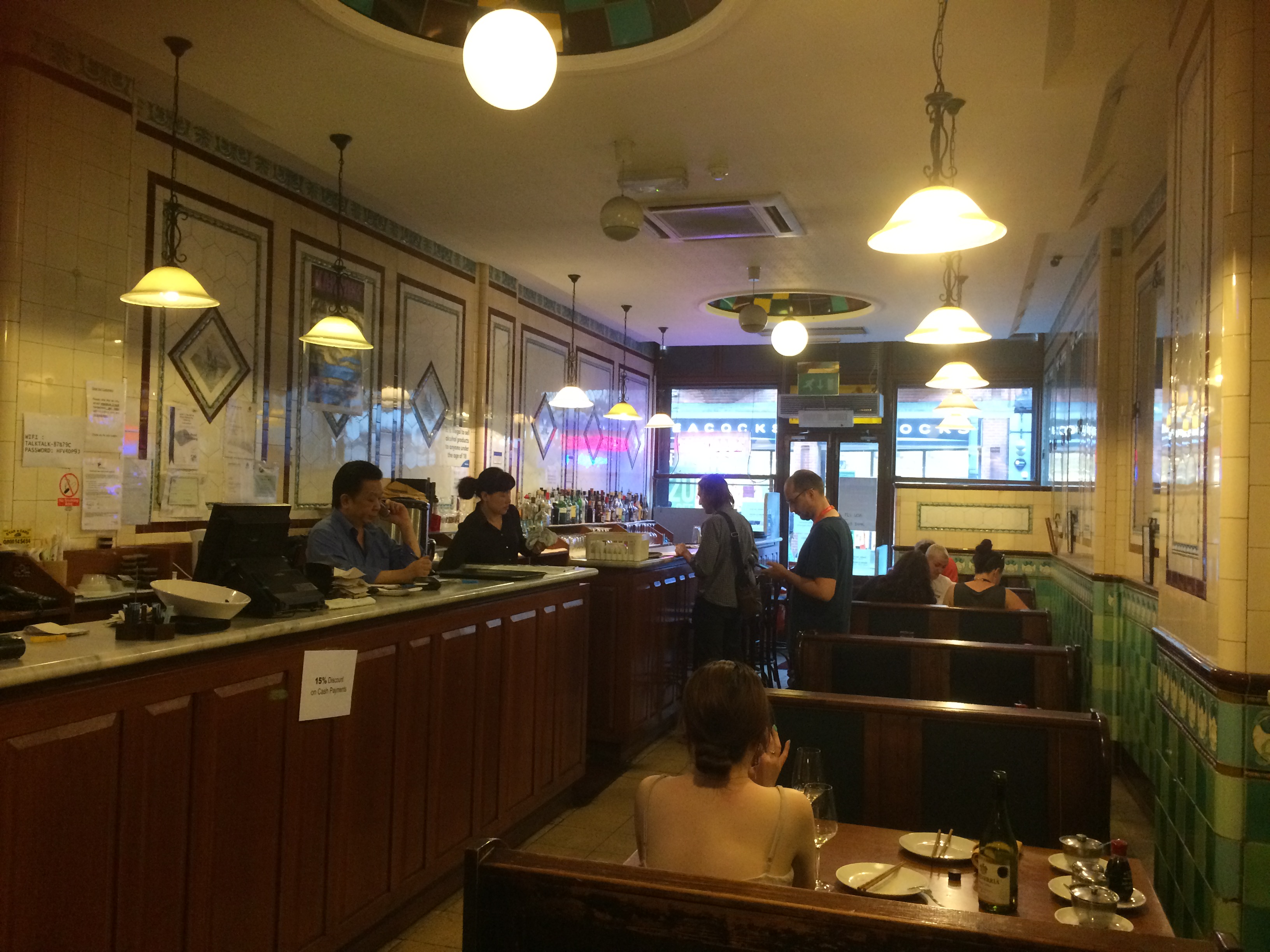
By no means a humble pie [shop]. Interior view of Shanghai restaurant showing the original pie and eel shop decor in Dalston, UK. Photo © Jacqui Newling
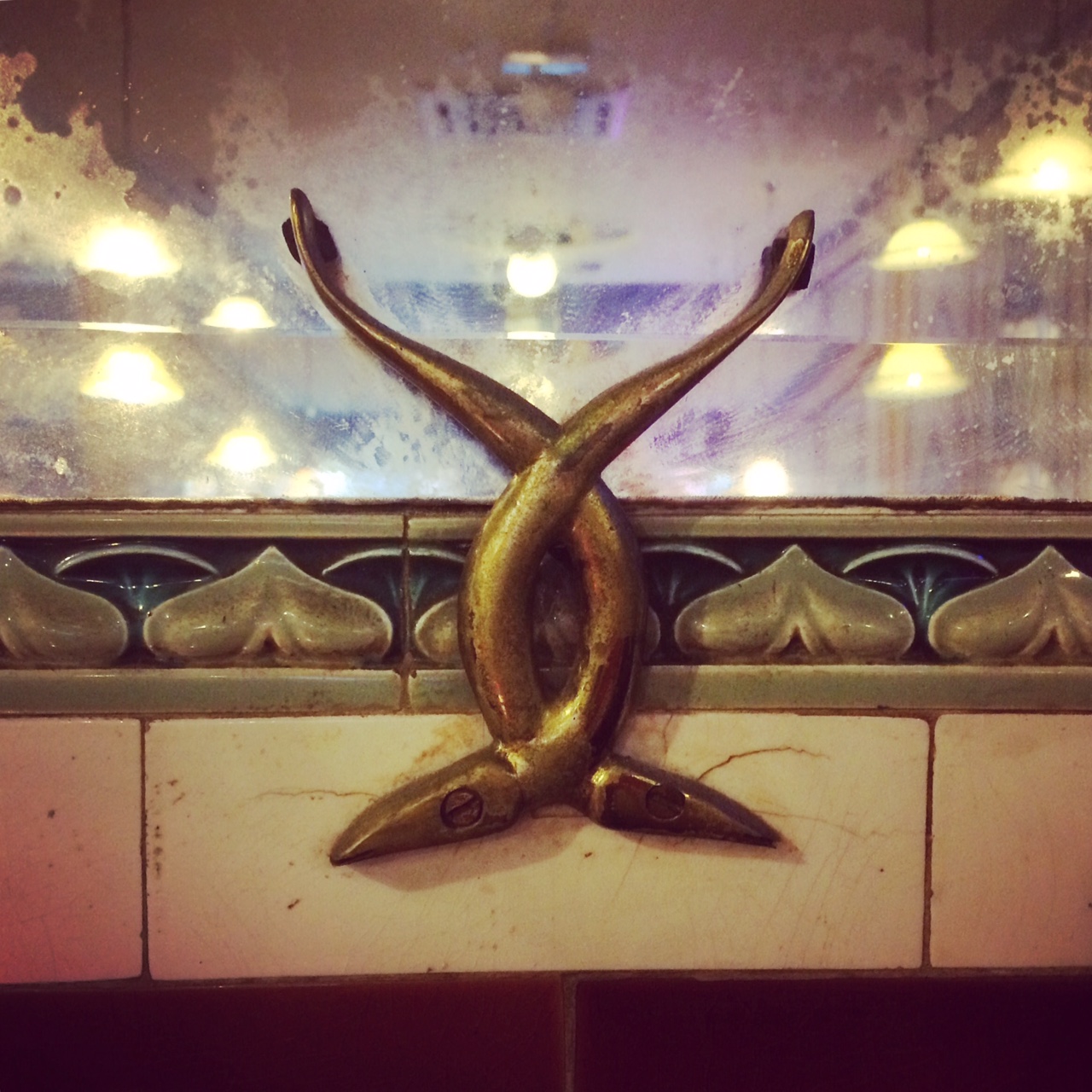
Eel shaped brass fittings at the Shanghai Restaurant, Dalston, UK, installed in 1901 when the premises was F. Cooke’s pie and eels shop. Photo © Jacqui Newling
Goddard’s Pies and Eels House, Greenwich, established 1890
I was delighted to find another pie, mash and eels shop in Greenwich, just opposite the East End on the south side of the Thames. East Enders often found work in the docklands around Greenwich, with easy access via a foot tunnel under the river, and the shop was set up to satisfy, and cash in on, their tastes. Looking like a village pub conveniently located on a busy street corner near the Cutty Sark and glorious King William Park, Goddard’s Eel and Pie House, established 1890, is another third generation institution.
Newspaper clippings in frames on the walls tell of the shop’s heritage, reveal that the family abandoned selling eels in the 1970s, when local supplies depleted and they became an expensive commodity.
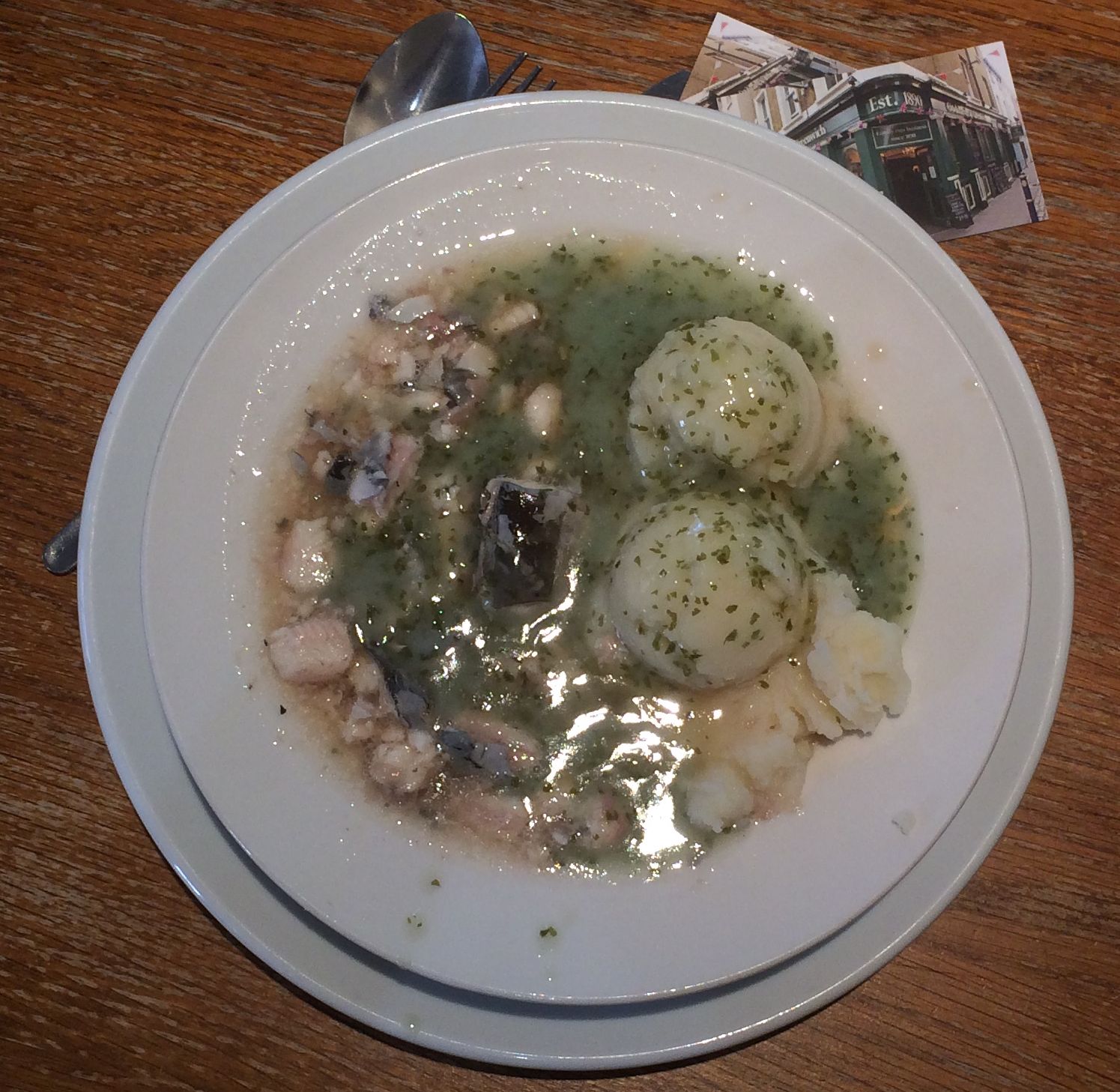
Hot eels with mash and parsley ‘liquor. Goddard’s pies and eels house, Greenwich, UK. Photo © Jacqui Newling
Lifting the lid on a lost art
Responding to Greenwich’s current popularity as a tourist destination, with the Maritime Museum and Cutty Sark attracting people from around the globe, Goddard’s is finding new customers who are keen to tap into the areas heritage. “Heaps of people order eels!” I’m told at the counter – “especially Americans and Australians!” I decided I couldn’t face the full meal deal, so forwent the pie and ordered hot eels with mash and parsley ‘liquor’. Not bad tucker, but very fiddly to navigate the bones, which collected, midden like, in a little pile on a napkin beside my bowl.
Complimenting the manager as I left Goddard’s, I asked him how they prepared their hot eels; “we don’t he said – not any more. We don’t sell enough of them to make it worthwhile – they come over from Holland ready made in their jelly. Then we heat them to order.” From the fridge appeared a large lidded plastic basin containing very familiar looking one inch chunks of eels in jelly – exactly like the ones in F. Cooke’s shop in Hackney… could I have been told a slippery tale by a born and bred East Ender I wonder?
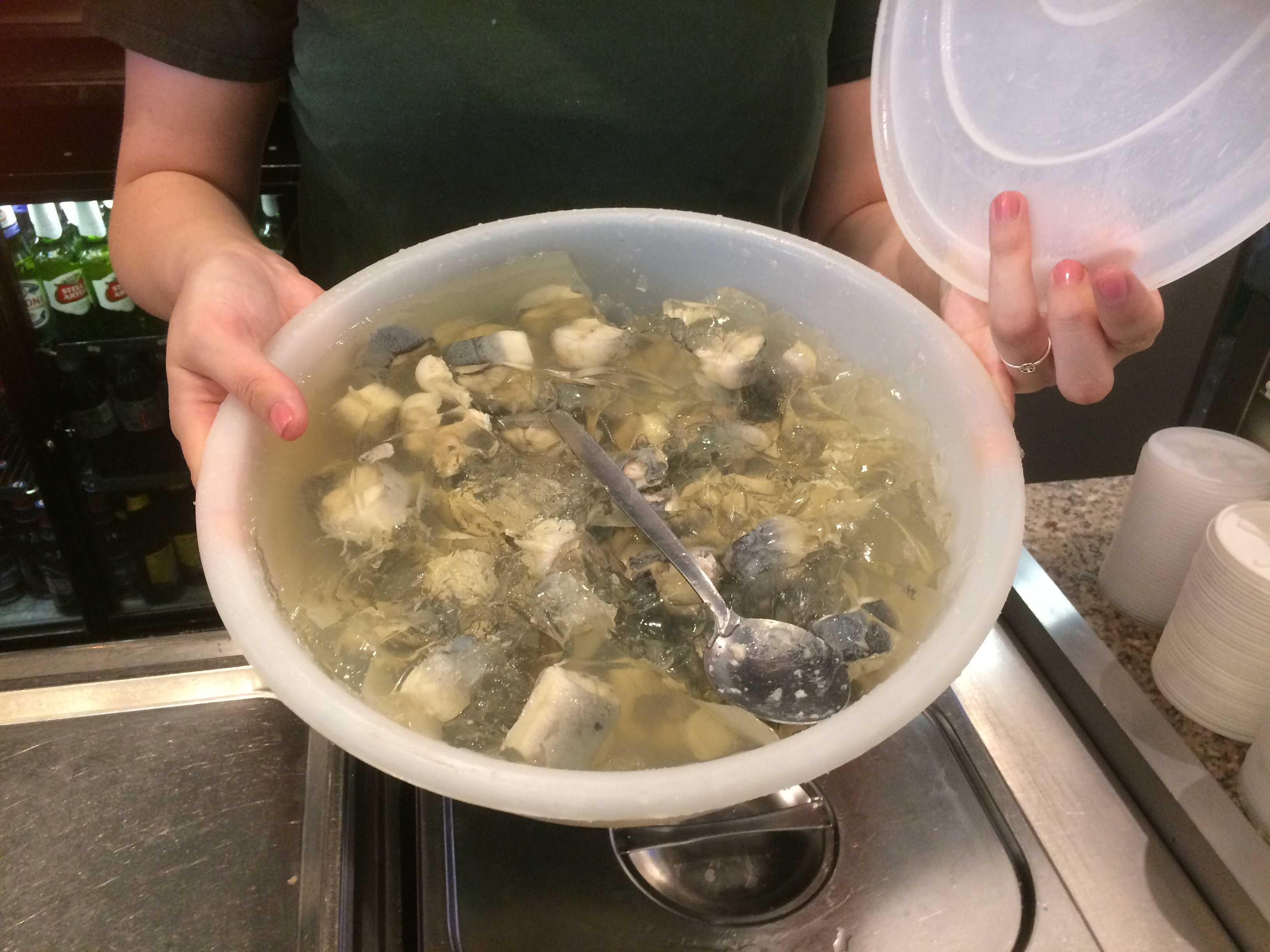
Jellied eel, imported from Holland. Photo © Jacqui Newling
Fading from view
The demise of these traditional ‘hot and jellied eel’ outlets reflects the changing nature of London’s East End, now a highly cosmopolitan community. An East End institution, Tubby Isaacs sold eels and other seafood specialties such as whelks and cockles from a roadside van in Aldgate, near Whitechapel, for 94 years before closing in 2013. Responding to demographic changes the food van that occupies the corner of Gaulston Road, where Isaacs’ once traded, sells Halal kebabs and burgers, meeting the contemporary neighbourhood’s tastes.
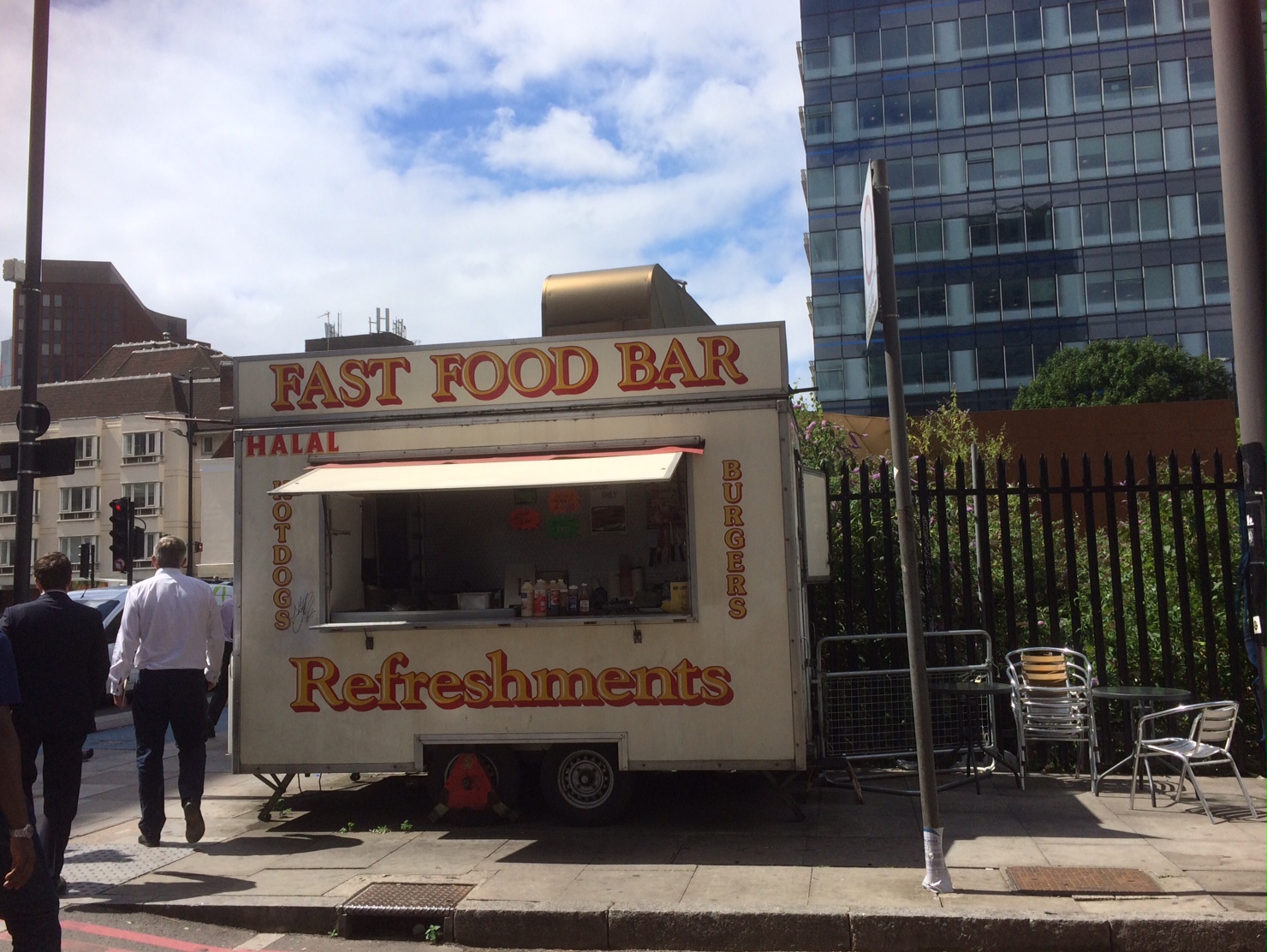
Local flavour. Hot dogs, hamburgers and doner kebabs have eclipsed eels as street food in London’s East End. Photo © Jacqui Newling
Newspaper articles suggest that their is now a resurgence in interest in eels as a handy food source, with Tescos supermarkets making a bold move to sell tubs of jellied eels, so perhaps it’s not a lost tradition, but a case of eels migrating out of the East End and finding new waters.
Further reading (or click on links in the text above)
http://ngm.nationalgeographic.com/print/2012/08/east-london/newman-text
